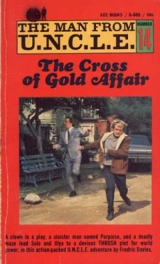
Текст книги "The Cross of Gold Affair"
Автор книги: Fredric Davies
Жанры:
Боевики
,сообщить о нарушении
Текущая страница: 5 (всего у книги 10 страниц)
“You had better wait a couple more minutes, Solo,” came the voice from above. Napoleon stared up at the ceiling. “It will take a few minutes to clear the gas, and for the next room to cool down. You did remarkably well for a first try. We’re betting on you to get all the way up to the laser beam next time.”
“I suppose you’re watching the whole thing?” Napoleon asked conversationally, wishing he had something to drink.
“I’m monitoring the maze on our console. Each room lights up as you enter it, and if you trigger any of the traps I read their signals, so you might say I’m watching the whole thing.”
“Too bad. If you were getting a real strong picture, I could manage some shuffle-off-to-Buffalo at the end of each skit, to brighten your evening viewing. How about some second-boy-from-the-right kicks? I’ve got a whole raft of vaudeville routines available, which you can record for presentation at a more convenient time.”
“No, I’ll just enjoy thinking about it. The viewscreen is unfortunately tied up right now by Mr. Porpoise. He’s making some calls to ensure that your investigations don’t get any of our other people upset. And later he’ll want to watch us dispose of Gambol off the pier end, so probably you’ll just be a bunch of lights to me.”
“Sorry I can’t delight you with my glass-dodging hootch dance, then. I’m just beginning to enjoy this maze. High hopes for high times to come. Do you toast me in champagne if I make it all the way through?”
“You get a winner’s horseshoe of flowers, just like at the races. But how did you beat the exploding mirror? I saw it trigger, and I thought that would get you for sure, unless U.N.C.L.E. agents come sheathed in steel.”
“As the robot actress said to the bishop,” said Napoleon, “I wouldn’t want you to overestimate me, Arnold. Your ultrasonics heated my small change, and skill and science did the rest. With your maze working for me like that, I may get through yet.”
“You really have me worried, Solo.” Arnold’s voice had turned harsh. “There are over thirty ways for you to kill yourself in that maze, and I don’t think you’ll luck your way past all of them. Oh, by the way, since you sank his drink, Mr. Porpoise told me to tell you that you can have all you want to drink.” Napoleon couldn’t help but be interested in this offer. “All you have to do is step into the next room. Ha!” The floor over the knives slid open again, revealing the cold Atlantic and the many-bladed platform reaching up through the water. “Just step in there, and you can have all the water you’ll ever want.” The floor, triggered from Arnold’s console, snapped shut again.
Knives had held a special horror for Napoleon ever since his encounter with the mad Dr. Adams who had nearly succeeded in getting him to perform his own execution in a nightmare room full of kitchen cutlery. Sitting tailor-fashion in the Space Ship Room, Napoleon felt the memory of that piercing, stomach churning day run through him. He wasn’t blindfolded now, and his hands weren’t tied, but he still had no great urge to fall into the Atlantic through a jungle of foot-long rusted steel blades.
His thirst grew as he sat, staring at the floor of the next room, seeing the knives beyond it. What use was there in trying the maze again, with Arnold monitoring his every move, and with bigger and better traps to come? “Out of the frying pan and into the fire, for real,” he muttered glumly as he lifted his gaze to the furnace room. “Hey, wait one. Why not into the water? Out of the frying pan and into the water would be a new twist.”
“You ready to try again, Solo?” Arnold broke in from above. “The ultrasonics room is cooled off now, and I’ve triggered a second line of traps in the exploding mirror room. You ought to have a real ball this time.”
Napoleon ignored the intrusion. He reached into his pockets, but the furnace-room hadn’t left him any small change. His belt, he thought; the buckle might do to trigger the trap.
Swiftly he took off both belt and pants, pressing the latter out flat. He took one pantsleg and folded it over once and then started rolling the leg up toward the inseam. He smoothed the waist and seat into the roll and then continued down the other leg until he got to the knee. Holding the coil of pants, he snapped it out straight in one easy motion. The pants unrolled perfectly, and Napoleon quickly rolled them back into a tight coil. The remaining ‘foot and a half he wrapped tightly around his left arm. He laced his shoes tightly, for the protection he hoped they would give him in the climb to come.
He leaped across the deadly trap again; pausing not at all in the furnace-room, he passed into the room of shattered mirror. The glass nozzles started hissing, but Napoleon, holding his breath, picked up as many of the large shards as he could find and made of them two piles. He tossed the first pile onto the glowing walkway. Sparks danced over the slivered glass. The second pile he took back with him into the ultrasonics room.
Let’s hope these will keep enough of Arnold’s lights flashing to keep him confused, he thought as he scattered the mirror fragments around the heating walls. He faced the trapdoor room and prepared himself for the final step in his plan.
“I hope it doesn’t insist on copper quarters,” he said aloud, hoping to cause Arnold just that much more confusion, as he flipped the belt into the adjoining room. The electricity flickered briefly, and once again the floor yawned to reveal a sea spiked with ugly death.
In that instant that the electric charge turned off, just as the trapdoor slammed apart to empty his belt into the brine, he dived through the opening in a whiplash twist that had to be invented as it was being performed. Before his body was fully through the trap, he brought his left arm full around, sending the rolled trousers whipping straight up into the room above.
The trap closed, catching the last few inches of out-flung pantsleg. Napoleon hung in a curled ball, scant inches above a crisscross of razor-edged death. “I wish cuffs were in style this year,” he muttered as he swung himself in a growing arc on his improvised trapeze. A ripping sound, and a sudden lack of pull on the supporting left arm sent him spinning above the knives. He reached madly for the piling that had been his target.
“This hairbreadth stuff has got to stop.” Again, he was scant inches above death, but this time with both arms and legs wrapped tightly around the wet, slimy, algae covered, most welcome piling in the whole world. Napoleon climbed, shinny style, up and around the piling, only to find that Arnold’s field of knives extended for another dozen feet, clear to the edge of the pier. The next closest piling was at least ten feet away, just inside the border of the blades, and far outside his leaping range under the circumstances.
“Now what, o miraculous magi? Do you disappear in a puff of smoke? Or walk across the ceiling? Or maybe hang by your thumbs? The ceiling?” Napoleon tentatively reached out to an eight-inch beam transversing the pier. Just maybe he could support himself between the beams. The remains of the pants he wrapped more tightly around his left arm. The right would have to make do with the protection of the jacket he still wore.
Twisting once more to a face down position, and keeping himself supported on the piling with his back and bare legs, he reached both arms as far out along the beams as he dared. The knives, well below him now, had never looked closer or more hungry. The sweat of fear stung his eyes and froze him in a spider posture, already uncomfortable to his straining limbs.
This is no time to get glued to one spot, he decided firmly, and certainly not the place for it. By sheer force of will he managed to squirm and crawl forward between the beams until his body was stretched out away from the piling. The beams were just too far apart for Napoleon to use his elbows and upper arms to bridge between them. This put them too close together for him to use his hands. So pressing outward against the two beams with both forearms, shoulders creaking with the strain of supporting his 180 pounds, he slowly worked his feet and legs up off the piling and into a similar spread-eagle position.
With every move of his legs his knees were tom by the splintery beams, and his buttocks threatened to launch him downward through their contacts with the planking above. Both legs were bloody, and his shoes slipped constantly rather than grasping as bare feet might have. Napoleon worked his legs forward to crowd his trembling shoulders against his aching arms. There was now nothing at all between him and the knives below except the pressure he was exerting on the two eight inch beams.
Eons later, the jacket worn through, blood dripping freely and soaking both the cloth and the beam, Napoleon had worked himself four feet out from the piling, and years closer to his grave. Thwamm! The trap behind him slammed open, and nearly undid all of his work. He froze again, his muscles locked in a panic cramp.
“Arnold,” the voice of Apis bellowed out, “he ain’t down here.”
“What? He must be-look again.”
Napoleon sent up a fervent prayer to the patron saint of spies that Apis wouldn’t look anywhere but at the knives below, and waited for another eternity.
“Honest, Arnold, there isn’t anyone down there. He must not have fallen through after all.”
“Then he must still be in the maze. Come on.”
The trap door slid closed again, and Napoleon gasped, partly in relief, partly from the pain he was forced to endure. Slowly, he inched one limb and then another forward, every foot gained meaning another pound of flesh spent. Finally he forced first one and then the other of his numb yet aching hands into the crevice formed by the joining of the straight beams with the curved piling. He had crossed the ten feet, defying both death and gravity.
Deeper and deeper into the narrowing slots he forced his powerless fingers and palms. Finally, satisfied, he lessened the pressure on his legs and fell forward onto the piling. His legs flew apart, the straining muscles relieved of the pressure refusing to answer his brain’s command. Try as he might he couldn’t force them around the piling. His hands and the rough wood gouging into their flesh were his only support. Slowly he mastered his muscles again; his shoes, now in a position to be of use, cut grooves with their leather soles into the algae covering the piling.
I may not live through this, hut at least the hard part is done. I congratulate you o miraculous magi; you have pulled it off again. Napoleon worked his way painfully around the second piling until his back was to the open sea. The field of knives, five feet below, extended not more than two feet from his point of vantage.
If Thrush has taken the trouble to mine the entire Atlantic for falling spies, I suppose I’m still in trouble. With all the strength he could put into a final push with his legs, he leaped far out into the icy water.
His wrists were still bleeding from the bottle that had cut his bonds, and both hands were badly slashed by splinters. His right arm and both legs were deeply lacerated, his left arm lacerated too, but not to the same scale. When the freezing salt water hit his wounds the pain fled instantly, but his agonized muscles rebelled at the shock. Napoleon cramped as a swimmer had never cramped before.
He felt himself drawn up into a hard knot of fiery freezing pain as he sank like a dead weight into the sea.
Chapter 8
“Sorry to shoot and run.”
Three of the four streetlights were knocked out. The fourth lit a small portion of street, lone sentry in the last block of Coney Island’s attempts at a city by the boardwalk. Kind of sad, thought Illya. Probably only a matter of time before some kid lets fly with a rock; maybe if they break that one, too, the city will have to put up new lights.
He parked the gray U.N.C.L.E. sedan directly beneath the light. He always preferred to look ‘normal’ with that car. He had long ago discovered that any attempt to stay out of sight-such as parking in the dark here-brought up every curious bystander. In the glare from the only streetlight the streamlined sedan would be too obvious to be worth gawking at.
The chill of evening grew deeper as he walked away from the car toward the ocean. Cold wind off the water made him wish his jacket were a topcoat, but he zipped it up and kept his chin down to make the best of things. To cap the unpleasant temperature, the warm-voiced girl in Communications was trying to tell him they were unable to pinpoint Napoleon.
“But why is that?” he snapped. It was little comfort to talk to a personal communicator when you wanted to shake somebody, or get your hands on the computer that was causing all the problem. “When we left this morning the system would all but write down addresses of anyone we visited. If I had the expensive computer layout you have, I’d crack the whip with it. No computer of mine would say I don’t know,’ ” It did his temper no good to keep thinking about the hour lost in Gambol’s office with Napoleon being trundled out here by Thrush. Much too much could have happened in that hour. And, as Waverly would have added, the lost time was helping Thrush clean up its trail; the whole stock affair was getting further out of control each moment now that they knew U.N.C.L.E. was out after them.
“When we lost his signal, you and Mr. Solo were so widely separated that we had reduced the scale a very great deal,” she said. “He was apparently doing quite a bit of moving around, because the map was shifting back and forth, and going up and down rapidly.
“Up and down?” Illya looked at his communicator quizzically.
“Yes, sir. The altitude of his blip went from sea-level to the height you are at presently-we have determined that that is the boardwalk. Then it went up quickly, and down like a shot, with considerable lateral movement. Just as it quieted down and we started to triangulate, his signal stopped and yours became the primary.” She sounded miserable about that part of it. “The display jumped to you, and we weren’t ready for it. Four of us were sitting in front of the display console watching it and taking readings off known landmarks. But before we could get anything or even record the picture, all we had was your blip in Manhattan. All w know is that Mr. Solo was on the waterfront, right at sea level, and the picture sort of looked like it does now. Where are you.”
“Sort of,” he said scathingly. There was no answer.
He walked down a short flight of stairs from the promenade to the beach and began a reconnaissance in approved manner. The Atlantic looked forbidding under the stars, flat and entirely unappealing. As far as he could see along the beach, there was nowhere to hide Napoleon. He supposed he might look for a submarine conning-tower poking through the surface of Lower Bay, or search the sand for a Thrush picnic outing. Anything, never mind how ridiculous, would scratch the itch he was building up to have some kind of tangle with the black-hats. At least it would help warm him up.
Over his communicator, the girl back at U.N.C.L.E. Headquarters tried to apologize to him and cheer him up. “You know were all heartsick about not being able to help you and Mr. Solo. It’s an experimental linkage of the computer to a map-display, and we feel horrible about letting it snap out of our control like that. All of us are going to stay right on it until we can identify the last picture he sent against your whereabouts.”
“All well and good,” grumbled Illya, “but you don’t have to work this end of it.” He knew right away he shouldn’t have said that.
“Oh, Mr. Kuryakin, I wish I had the opportunity to get a beach excursion as part of my job. We’re shut up here in a room full of wires and transistors, while you’re out in all that fresh air, away from the grit of midtown air. You Enforcement people just don’t know how lucky you are.”
I could shut her off, he thought. One finger could snap the communicator to off, and leave him out on the beach without even a smart-aleck girl to talk to. He kept trudging along, and decided to give as good as he got.
“Personally, I would love to be trapped in that warm, homey Comm laboratory, surrounded by coffee smells and stagnant old air conditioning air.” He stopped walking and stood on one leg to empty wet sand from his shoe. “You have my personal recommendation to the Enforcement Section, Miss. If you’re eligible for transfer, just trip right on over there. Tell them you want a job patrolling a frozen stretch of waterfront in November without even knowing what to look for.”
Suddenly the boardwalk curved away to give Illya a longer view down the beach, and he stopped. Ahead he saw an amusement pier with all lights blazing. He moved into the shadows under the boardwalk and spoke urgently into the communicator.
“This is where it’s at,” he said. Before he was finished with that much the girl who’d been bantering with him reacted to the change in his voice. His communicator clicked twice, and he was linked through the monitor on Waverly’s desk. “Ahead of me is a so-called fun center, lights on on all sides without a soul around. There’s a car pulled up near it with its rear doors open. Do you think somebody was in that much of a hurry to visit Coney?”
“No, Mr. Kuryakin, I don’t. Generally there is no activity on the beach at this time of year. A brightly illuminated public building at night is highly suspect.”
Illya moved in closer, trying to keep his attention on the fun house and his communicator, while at the same time not walking into the pillars he was using for cover. Waverly spoke again.
“Identify your position, please, Mr. Kuryakin, so that our people in Communications can use local maps to orient themselves. Can you tell us which amusement pier this is?”
“Yes, sir,” he said, crouching behind a dune. “I’m under the boardwalk, so I can’t see which street runs to the beach here, but it seems the building has enough identification on it to satisfy everyone. If you can believe this, it is labeled on the side toward me, ‘The Hilarious, Rollicking, Unparalleled Space House.’ ” He had to repeat that for his chief before he was allowed to continue.
“That name figures in bright red and yellow lettering, in a typeface made famous by the late Phineas T. Barnum. If the smallest punctuation mark in it is less than a foot across, your humble and obedient servant will willingly eat his sweatshirt. The initial letters are a gaudy, ten-foot-high spellout just waiting for someone to link them up with our feathered friends .” He crept forward, keeping well down behind what little cover he could find.
“Please don’t become hasty regarding your sweatshirt, Mr. Kuryakin,” said Waverly. “We may assume Thrush is aware that advertising benefits everyone. Besides, if the temperature and weather reports on that beach may be believed you will have good use for that sweatshirt tonight. Our Meteorology Department tells me that the hurricane Quiggy, although not another disaster like 1965’s Betsy, has turned a cold front toward you, and the temperature where you’re standing is already down to thirty-one. I trust you will not have to endure that sort of weather for long.”
“Yes, sir. I can’t exactly knock on Thrust’s front door and ask shelter from inclement weather, though.” He tried beating himself with one arm to keep warm while holding the communicator, and found it as unsatisfactory as clapping with one hand.
“Well, I’m certainly pleased we turned up something,” said Waverly, “even if it is so impertinently scrawled across the beach for everyone to see.”
The Communications Department Head interrupted just then. “Excuse me, sir, but Mr. Kuryakin has now oriented himself very nearly where Mr. Solo was earlier this evening. All of us who were watching the map then agree that this is where we were looking when the other blip went out.”
“Very good,” said Waverly. “This establishes a definite link between that technicolor Thrush building and our friend Mr. Gambol. Now if we can only use his records to generate some evidence against the investors who worked with him, we just may have a case.”
“Why do we need more of a case than we have?” asked Illya. “This is where Thrush is, we know Gambol came here, and they probably have Napoleon inside. With the puzzles split wide open, haven’t we wrapped the whole thing up?”
Waverly sighed into the communicator. “I’m very much afraid our Finance and Legal sections are recommending we remain silent, based on information we now have. At present we have five thousand investors who can be categorized by the threefold code system Porpoise used to direct his operations, but we have no proof that they really were using this extraordinary procedure. If we have the S.E.G. step in, we’ll stop things but lose everyone. If we take them to court the best we can hope for is years of litigation and counter-suits. What would a judge say if we told him your amusement-park people were spreading stock-market information through a newspaper crossword? How many times has the gold market been cornered that way in the past?”
“We’d be a laughing-stock.” Illya looked glumly at the communicator and at the ridiculous building lighting up the beach in front of him.
“Decidedly,” said Waverly. “Unfortunately, we turned up nothing really conclusive in our search of the brokerage and all the other tenants of that building seem to be pleasantly, honestly secure in unrelated businesses. All we have is our list of suspects, and our own very certain knowledge that they’re bilking the Exchange in connivance with Thrush. It’s up to you to help us get them all behind bars.”
Behind a pillar of the boardwalk Illya stood up and scanned the area. “I think I can get from here down to the pier without much risk of being seen. Perhaps from nearby I can figure some way to get inside that unfunny fun house. To keep from freezing, I may end up by having to walk right in the front door, though.” He signed off with characteristic abruptness and began a close-quarters inspection of the building.
He left the security of deep shadows in a low crouch, moving fast and taking advantage of every roll of the beach to keep out of the light. No one came out of the Space House, and he seemed to have no company along the windy beach but the abandoned automobile. In a few moments he was down at the water’s edge, hiding in the darkness underneath the pier.
As an alternative to the front entrance he marked the cargo door overlooking one side of the pier. Trucks driving up to it would have to use a ramp to deliver, but Illya suspected some heat-paste or a small bomb might work for him. The door was corrugated steel and looked solidly closed, but U.N.C.L.E. agents in the field usually anticipated doors at least that solid.
He ranged full circle about the pier, angling, in front of the fun house swiftly to be in the light as briefly as possible. He saw no signs of a flaw in their defenses. The exercise had helped him keep warm, but the main entrance still seemed the best way to approach the enemy.
Standing on the hard-packed, wet sand at the beach’s edge he realized more energy had gone into the skulking than it was really worth, even if he had gotten warm. His breath was coming fast, and he let out clouds of white every time he exhaled.
Then his eyes caught the flicker of a burning coal beneath the pier. It seemed to be part of a fire in shadow, and he went rigid, wondering if he had stumbled on some Thrush operation below the Space House, or if he was intruding on someone’s privacy.
Privacy can go hang at a time like this, he thought. My partner may be up there, and if I can take out an outside guard or two it’ll help the odds of making a successful rescue. With all the extremes of caution a death-laden career teaches U.N.C.L.E. agents, Illya moved in on the fire and strained to catch sight or sound of anyone lurking nearby.
In the darkness, on his belly in cold sand, he wriggled up to a pier support. Keeping his lean frame entirely behind the piling from the fire, he stood up quietly to peer out.
I feel like Oil-Can Harry, he thought, dashing from post to post, slithering around in the dark and plotting eviyal things to liven up the night as soon as I capture-And then he was next to the fire, staring down into it, seeing that it was covered with sand and deserted. Nobody, he concluded. All this skullduggery, all this deep guerilla warfare methodology, and I end up with a dead fire and no one around to tend it.
The camp had just been abandoned, he decided. Embers still glowed warmly in the heart of it. He scattered sand from the remaining wood, using his paper as a shovel, and then looked at what he was doing.
“I suppose I could warm my backside with this little pint-sized picnic fire,” he muttered. “In fact, with the night as rotten freezing unprintable cold as it is, I’m mightily tempted.” He conjured up a picture of himself before a roaring blaze, lacking only his slippers. “The crossword has served its purpose and can be converted to kindling-in fact, I don’t even need to requisition it, because 1 paid for it, not U.N.C.L.E. But all I need is some other night-crawling type to sneak up on me when he sees the fire. I’d probably be so content lolling in front of it that I’d invite him to clobber me.”
Self-discipline had seldom come harder. Nearly shedding a tear, he scooped more dank sand over the wood. “I’m probably doing the Fire Commissioner a big favor, anyway. Maybe they’ll give me a Smokey the Bear type hat ‘for not letting Coney Island bum down.”
He straightened and walked back up to the front of the Space House. Standing just outside the lighted area, he assessed the situation.
With no enemy agents circling the area, he felt sure that Thrush was riding a high wave of overconfidence. Deep inside they had Napoleon, of that he felt certain. Napoleon had just walked into their trap today, seemingly defenseless (because he had intended to be trapped), and they must have thought it a wonderful piece of luck to capture him so easily. Any U.N.C.L.E. agents following ought to have arrived shortly after the car from Gambol’s because certainly Thrush couldn’t know how U.N.C.L.E.‘s tracer device worked.
Their discipline ought to have gone a little slack after a time, thinking they had gotten a free prize.
Illya hitched his trousers up and opened his jacket to ready his pistol. “Napoleon is no prize,” he said under his breath, “and I think I’m going to have to go in there and convince them of it.”
As he stepped out of the shadows and went directly up to the entrance, he didn’t see three figures in denim watching him from the boardwalk. Neither he nor they saw the three Thrushes further back in shadow, who watched everything.
Apprehension dragged Illya’s feet as he approached the Space House that Thrush built. The fire below the pier had to be more than just an abandoned picnic, but what did it mean? Complete silence along the cold wintry beach was itself enough to raise his hackles-at other times of the year the place would be wall to wall with sweating hordes from three states, all fighting for a chance to dip a foot in the salt water and get indigestion from hot dogs and soda. The transition to a loneliness of such proportions, with wind moaning inland from the sea, was nightmarish.
He drew his U.N.C.L.E. Special and picked up speed as he stepped onto the piers asphalt. He seemed to float through the open doors, crouching low. Well into the room he discovered he was surrounded by the figures of armed men, who didn’t move or breathe.
Outside, three Thrushes pounced on the quarry they’d been watching.
Porpoise spun in his swimming pool like the center of a whirlpool. Color blotched his fat cheeks, and sweat poured over his face, making him submerge again and again to keep cool.
“Those fools have got to find Solo!” he repeated between giving orders and making calls to hasten the arrival of a submarine in Lower Bay. “If he escaped my maze, he had to swim away from it. Nobody can do that in this weather and outguess a search party. He’ll be blue and half dead. They’ve got to find him.”
Apis, hunched over the control console normally in care of Arnold, suddenly activated Porpoise’s television-ceiling to show a man’s shoulders and head. The man calling in struggled to keep from laughing at the sight of Porpoise, alarmingly hairless and fat, floating nude in a swimming pool.
“Code Canary,” said the caller. Porpoise scudded to a halt by reversing his sea-screw, and tilted the violet chair back to look upwards.
“Well, Captain,” he said with a thrum of fingers on his armrest, “how soon can you get here? I know all about your regular schedules. I know all about the three-mile limit. I know the waters, the storms offshore, and I know how high I can reach in the Hierarchy if necessary. How soon can you be here? I may require emergency transportation at any moment.”
Amusement touched the televised face. Many years at sea had marked it with furrows and a few scars, and the result didn’t look like a man who quailed at threats.
“The only factor you didn’t mention is the United States Coast Guard,” he said. “They tend to object to my Canary prowling waters with Uncle Sam’s initials on them; you probably won’t get Thrush Central to order me in as close as Sandy Hook, let alone right into your lap. I’m not too excited about unplanned invasions of New York Harbor anyway, and this trip sounds like a dilly. Fleet HQ hinted you may be evacuating your base under attack by U.N.C.L.E.”
“I am not yet ready to leave, and so far the only sign we have had of U.N.C.L.E. is an investigation, in the city, by one of their Enforcement Agents. You are needed, Captain. When we captured the U.N.C.L.E. operative and he escaped, the situation ^turned from safe to yellow alert in my mind. If my men fail to run him down before he gets word to his headquarters, you must be prepared to get me out of here.”
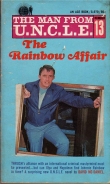
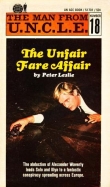

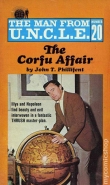
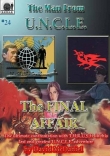

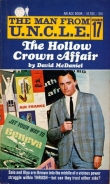
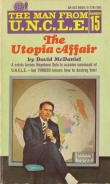
![Книга [Whitman] - The Affair of the Gunrunners' Gold автора Brandon Keith](http://itexts.net/files/books/110/oblozhka-knigi-whitman-the-affair-of-the-gunrunners-gold-38393.jpg)